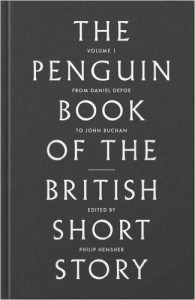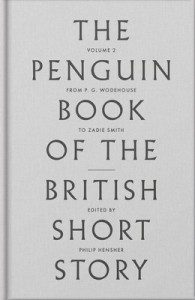“The Penguin Book of the British Short Story: Vols 1& 2”, edited by Philip Hensher
 Philip Hensher’s The Penguin Book of the British Short Story: Vols 1& 2 is a fabulous collection of writing. It does a broad sweep from Daniel Defoe to Zadie Smith, along the way including William Thackeray, Elizabeth Gaskell, Anthony Trollope, Max Beerbohm, P.G. Wodehouse, Evelyn Waugh, Roald Dahl, V.S. Pritchett, Naipaul, A.S. Byatt, Ali Smith et al. Here is Philip Hensher in The Guardian writing about this project: http://www.theguardian.com/books/2015/nov/06/british-short-story-philip-hensher-anthology , 6 Nov 2015.
Philip Hensher’s The Penguin Book of the British Short Story: Vols 1& 2 is a fabulous collection of writing. It does a broad sweep from Daniel Defoe to Zadie Smith, along the way including William Thackeray, Elizabeth Gaskell, Anthony Trollope, Max Beerbohm, P.G. Wodehouse, Evelyn Waugh, Roald Dahl, V.S. Pritchett, Naipaul, A.S. Byatt, Ali Smith et al. Here is Philip Hensher in The Guardian writing about this project: http://www.theguardian.com/books/2015/nov/06/british-short-story-philip-hensher-anthology , 6 Nov 2015.
Putting together such collections is always a subjective exercise. Philip Hensher too  recognises that such anthologies are subjective collections as is evident in his analysis of similar exercises undertaken by literary stalwarts like A. S. Byatt and Khushwant Singh. Every editor has their own principle of selection. Hensher has been criticised for his selection of writers, at times seeming almost arbitrary on whom he includes or excludes preferring to rely on “canonical classics”. ( FT Review: http://www.ft.com/intl/cms/s/2/462cdbcc-7f0b-11e5-98fb-5a6d4728f74e.html#axzz3zeTphElu , 6 Mov 2015) Yet he writes magnificently on the publication history of the short story in Britain. It is pure delight for the literary historian and a lay reader. He charts the rise of the short story as a form published first in periodicals and singly. The practice of anthologizing stories began in the early twentieth century when some of the best authors who had earlier been published in journals found it possible to put together a volume for sale by a publisher. Also the length of a short story continues to be a debatable point. It could be from 2,000 words to more than 30,000 words. He observes that a short story was usually written as single stories in journals by unestablished writers and these could be “very much stranger and more experimental than stories in a collection for a mainstream publisher”. As a form what made the British short story unique was its capacity for topicality, written as a commentary on a topical situation. But now the principal outlet for short stories seem to be competitions. These may offer reasonable prizes but at times these are funded by the eager contestants paying to enter.
recognises that such anthologies are subjective collections as is evident in his analysis of similar exercises undertaken by literary stalwarts like A. S. Byatt and Khushwant Singh. Every editor has their own principle of selection. Hensher has been criticised for his selection of writers, at times seeming almost arbitrary on whom he includes or excludes preferring to rely on “canonical classics”. ( FT Review: http://www.ft.com/intl/cms/s/2/462cdbcc-7f0b-11e5-98fb-5a6d4728f74e.html#axzz3zeTphElu , 6 Mov 2015) Yet he writes magnificently on the publication history of the short story in Britain. It is pure delight for the literary historian and a lay reader. He charts the rise of the short story as a form published first in periodicals and singly. The practice of anthologizing stories began in the early twentieth century when some of the best authors who had earlier been published in journals found it possible to put together a volume for sale by a publisher. Also the length of a short story continues to be a debatable point. It could be from 2,000 words to more than 30,000 words. He observes that a short story was usually written as single stories in journals by unestablished writers and these could be “very much stranger and more experimental than stories in a collection for a mainstream publisher”. As a form what made the British short story unique was its capacity for topicality, written as a commentary on a topical situation. But now the principal outlet for short stories seem to be competitions. These may offer reasonable prizes but at times these are funded by the eager contestants paying to enter.
There have been discussions about how relevant are these two fat volumes of short stories. Is there any point in buying these hardback print editions when a) most of these stories are available freely online and b) there is little diversity and inclusiveness and male writers outnumber women, not a true representation of modern British writing. Frankly, I think there is. There is something to be gained by reading familiar writers and discovering some unknown ones in this structured manner. Also it helps in organising oneself to read all those contemporary authors who were left out for various reasons such as David Constantine, AL Kennedy, Helen Simpson, Clive Sinclair, Rose Tremain, and Hanif Kureishi. It becomes even more problematic when the article, “The” is used in the book title, implicitly stressing this is a definitive collection of short stories from Britain.
All said and done these volumes are set to be a literary landmark. Buy them for your reading pleasure or academic interest — it is immaterial. They will make a wonderful addition to any personal or institutional library.
Philip Hensher The Penguin Book of the British Short Story ( Vols 1 & 2) Penguin Classics, Penguin Random House UK, London, 2015. Hb. pp. 1400+
9 Feb 2016


